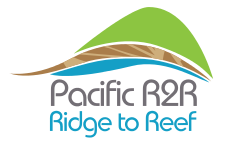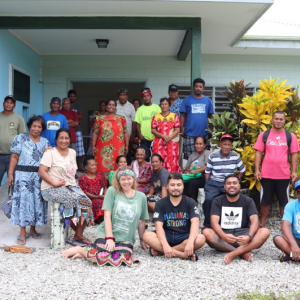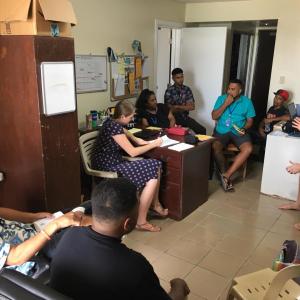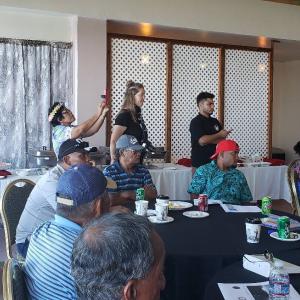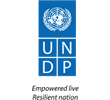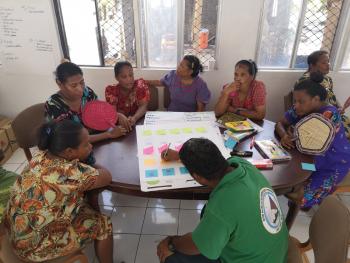
Reimaanlok Local Early Action Planning (LEAP) process strengthens natural, social and cultural resource conservation and climate change adaptation on Ebon Atoll in the Republic of the Marshall Islands
After many months grounded in Majuro due to the dengue fever travel ban to all outer islands, the Ridge to Reef (R2R) International Organization for Migration (IOM) team headed to the Southernmost atoll, Ebon in February 2020 to finalize the Local Early Action Plan (LEAP) with the community.
Workshops were held at the Ebon Town Hall at the end of February with over 40 community members from 4 communities on Ebon Atoll, Ebon, Enekoien, Toka and Enelook participating across 3 days.
IOM supported the community to complete the following participatory interventions:
- Map their community using IOM community mapping legends, identify their natural, social and cultural resources targets, non-climate threats to those resources, impacts, root cause and early actions to reduce non-climate threats.
- Develop their local climate story, including seasonal calendar by both men and women, assessing the vulnerability of target resources to climate change, identifying early actions to reduce climate change vulnerabilities and refine early actions to address non-climate threats.
- Identify their high priority early actions, Specific, Measurable, Achievable, Relevant, Time-bound (SMART) objectives, work plan and activities for their target resources.
RMI Ridge to Reef Project Coordinator explained that: “The Ebon LEAP has become a guiding document for the community and will be used to carry out activities outlined in the workplan.”
“The plan and information collected will also inform the Resource Management Plan currently being finalized by the Marshall Islands Marine Resources Authority (MIMRA) and progressing overall – Reimaanlok National Conservation Area Plan for Ebon,” she said.
Head of International Organization for Migration Majuro Sub-Office Angela Saunders said: “The International Organization for Migration is very excited to be part of the multi-disciplinary Ridge to Reef team to progress LEAP and action planning in Ebon.”
“This is fundamental to the next phase of Alternative Livelihoods implementation, and we look forward to continuing a strong partnership with the R2R project,” she explained.
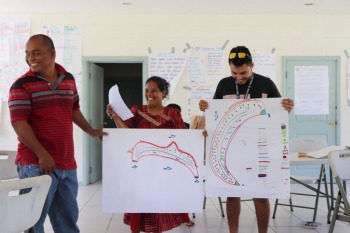
Ebon Mayor Marie Milne said: “This community driven process to protect our resources has allowed for productive collaboration in action. Ebon loves LEAP!”
Senior Community Member Leem Wajar said: “The LEAP workshops provided us with an opportunity to learn and share our traditional stories of Ebon with the younger generation that had never heard of them before.”
“The workshops helped us recognize how valuable our stories are as a cultural resource and discuss how to protect and conserve our stories through early actions.”
Reimaanlok is a National Conservation Area Plan for the Marshall Islands 2007-2021 developed to fill the need for a conservation area planning framework, and develop principles, process and guidelines for the design, establishment and management of conservation areas that are fully owned, led and endorsed by local communities based on their needs, values and cultural heritage.
The Plan highlights that in the face of global losses of biodiversity, the Marshall Islands retain some of the healthiest and most pristine coral reef systems anywhere in the world. In recent years, however, biodiversity in the Marshall Islands has become threatened by increased pressures on fisheries, increased urbanization and a loss of the traditional subsistence lifestyle, central to the identity and wellbeing of the Marshallese people. In addition to the above, climate change impacts from increased temperatures of land and water, increased sea level and storm activity threaten the islands’ resources and people.
The Plan also mentions that these trends have strengthened the commitment within the Marshall Islands government and island communities to establish and manage community-based conservation areas of land and sea, while building upon other resource conservation strategies. The aim is to revive the physical and spiritual connection of people to their environment, to ensure the sustainable use of resources and food security, and to conserve the remarkable biodiversity of the Marshall Islands.
The Reimaanlok conservation planning process relies on a broad spectrum of expertise and community engagement, including from the following organizations and groups:
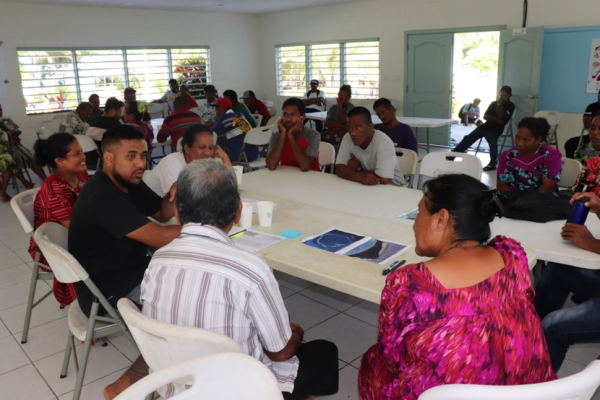
- Coastal Management Advisory Council
- Marshall Islands Marine Resources Authority
- Ministry of Resources and Development
- RMI Environmental Protection Authority
- College of the Marshall Islands
- Office of Environmental Policy and Planning Coordination
- Historic Preservation Office
- International Organization for Migration
- Ministry of Internal Affairs
- Marshall Islands Visitors Authority
- Marshall Islands Conservation Society
- Natural Resource Assessment Surveys
- Youth to Youth in Health
- National Training Council
- Local government councils
- Women’s, men’s, and youth groups
- Churches
- Teachers
- Iroij (chiefs)
- Alap (land managers)
- Dri-jerbal (workers)
Developing the LEAP involved six main steps:
- Getting organized, including getting to know the community and understanding them
- Raising community awareness about climate change
- Participatory identification of priority social and natural resources
- Participatory identification of threats, and characterizing the vulnerability of priority resources to climate change impacts
- Community identification and prioritization of potential solutions (early actions) to address threats and reduce vulnerability to climate change impacts
- Community identification of desired results, and measurable objectives, and development of an action plan to achieve those results
Each of the LEAP steps was undertaken over a series of community meetings throughout November 2019 – February 2020.
